Smart glasses and virtual reality headsets may be the way of the future, but that doesn’t mean we’ll be giving up our phones anytime soon. Motorola’s head of customer experience, Ruben Castano, told CNET exclusively ahead of the company’s Edge Plus debut that this was indeed the case.
When asked how the metaverse will affect smartphones and future gadgets such as smart glasses, Castano responded, “At the core of everything will always remain the smartphone.” “The smartphone is a very private instrument. It’s something you constantly have on your person.”
As my colleagues, Scott Stein and Andrew Morse explain, the metaverse is a broad phrase that refers to online areas where individuals may work, play, and interact using digital avatars. The notion isn’t new, but it’s gained a lot of traction recently as firms like Meta and Microsoft have made it a major element of their operations.

At the same time, tech giants such as Meta, Sony, Snap, and Microsoft have made progress in the development of smart glasses and VR eyewear in recent years. Both advancements are expected to play a crucial role in the future of personal technology. If the metaverse becomes the next major evolution of the social internet, then smart glasses could one day be our preferred method for accessing it. Even Apple is rumored to be working on a headset of its own.
But, according to Castano, a future in which individuals wear smart glasses on a regular basis is still a long way off. For the time being, the most popular metaverse incarnations will be those that we can reach with our hands. Minecraft, Fortnite, and Roblox have all been mentioned as instances of metaverses that may be accessed through our smartphones today.
Relevant: 8 Best Smart Glasses for Everyday Science Fiction
In relation to the metaverse, Castano remarked, “It’s expanded reality, and there are many different flavors of that.” “I believe that ordinary people will be able to access much of this metaverse, this digital overlay, directly through their phones.
Motorola is best known for its phones, but it’s also exploring emerging technologies like smart glasses. Its newly announced Motorola Edge Plus phone supports Qualcomm’s Snapdragon Spaces XR software development platform for augmented reality glasses. Its parent company Lenovo also makes a pair of smart glasses called the ThinkReality A3. Motorola recently announced a “5G Neckband” with Verizon, which is designed to house computing components in the interest of making smart glasses lighter.
It’s hardly surprising, therefore, that Castano has considered smart glasses and the metaverse. According to him, smart glasses will be “the next level” of metaverse access devices. However, they shouldn’t be mistaken for a phone replacement; the two gadgets will most likely function together.
It exemplifies how phones are changing their roles. While we mostly use them to communicate, check emails, and watch movies, they’re also becoming our digital wallets, vehicle keys, and connectivity hub for newer products like smartwatches and wireless earphones.
“More and smarter devices become available to consumers,” he said. “But at the end of the day, the phone will always be kind of that central controller for them.”